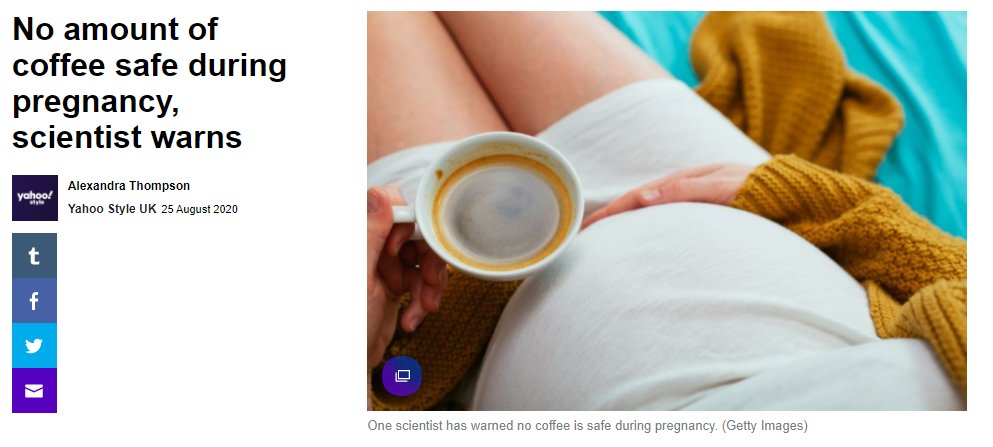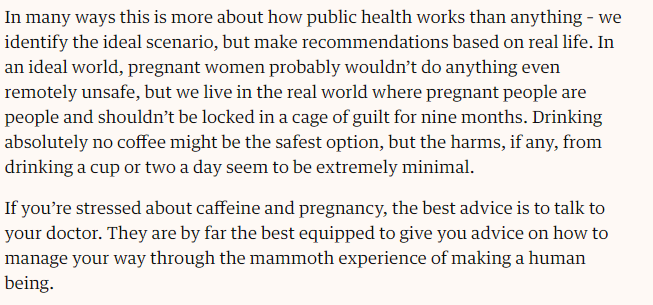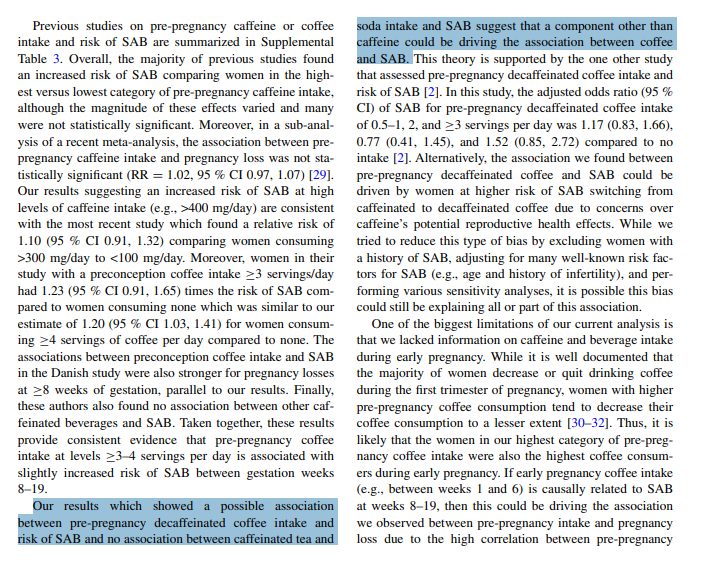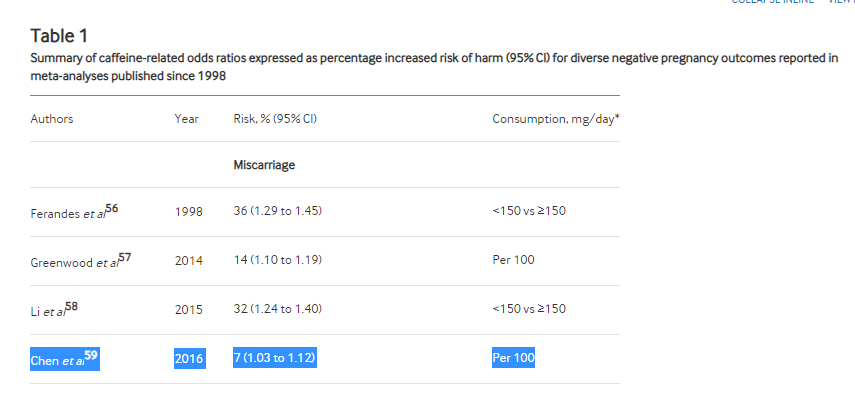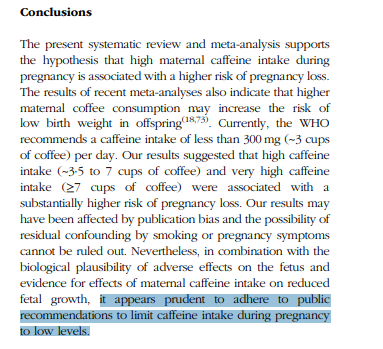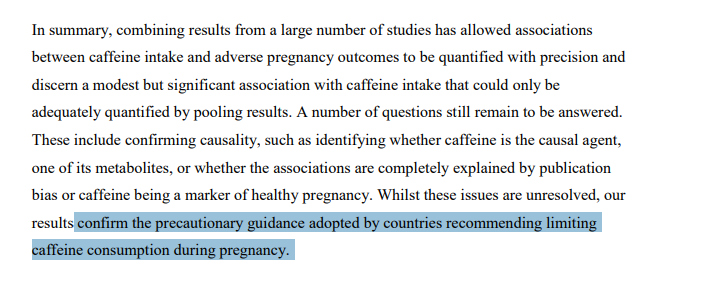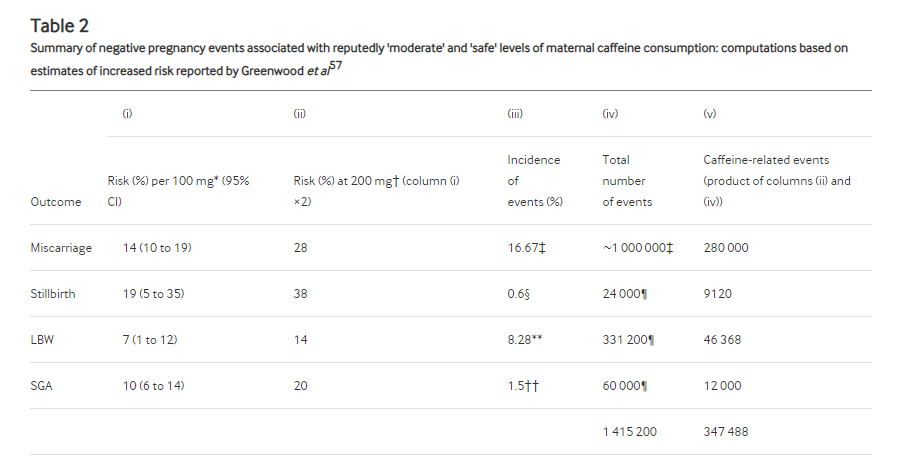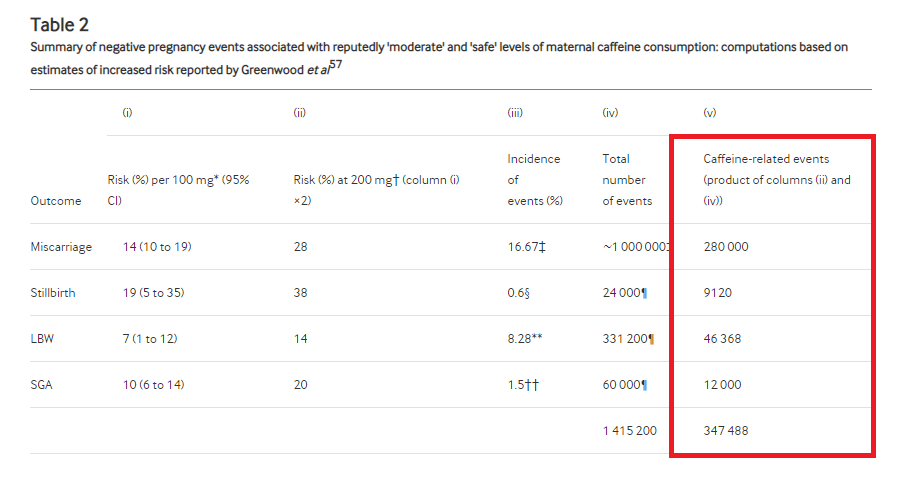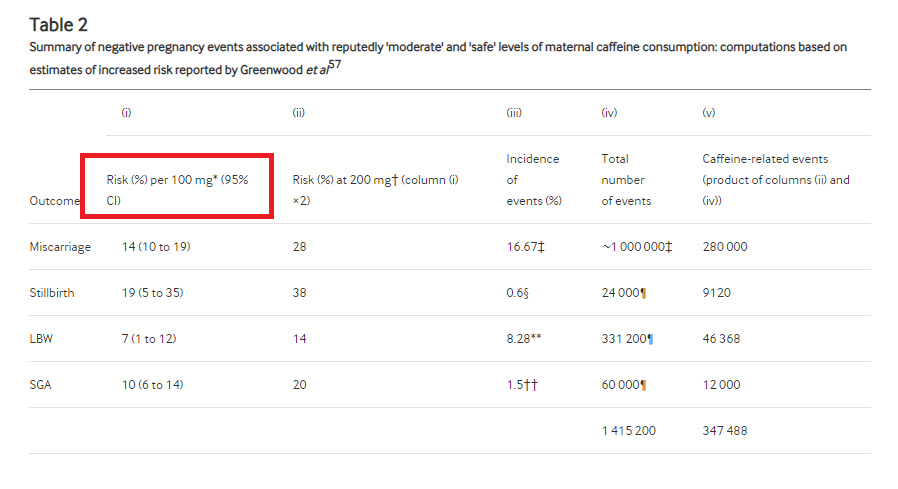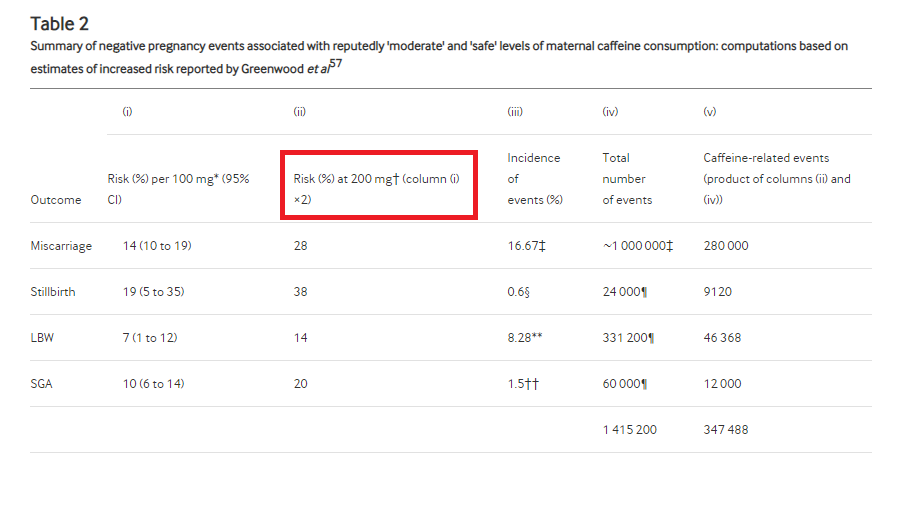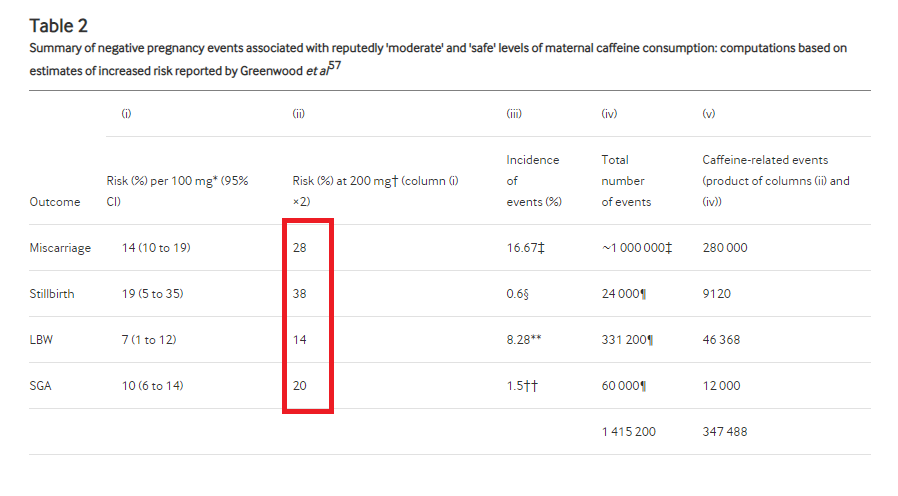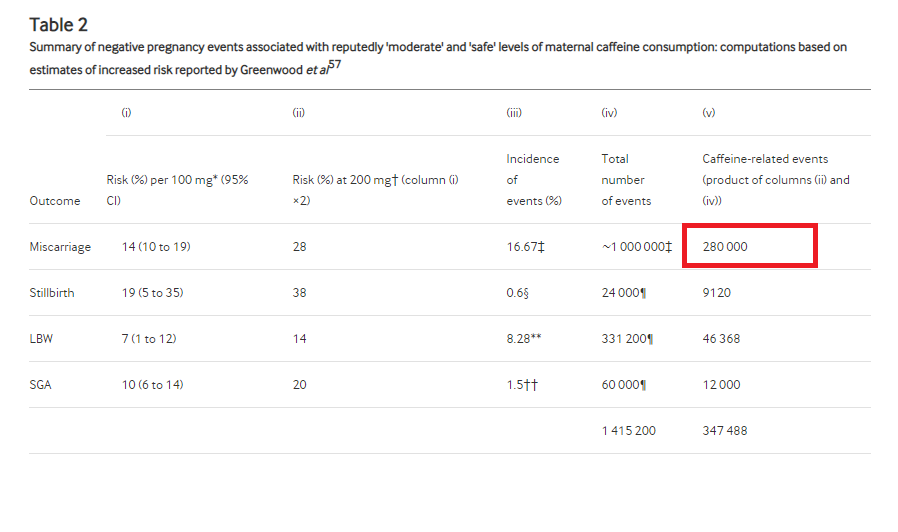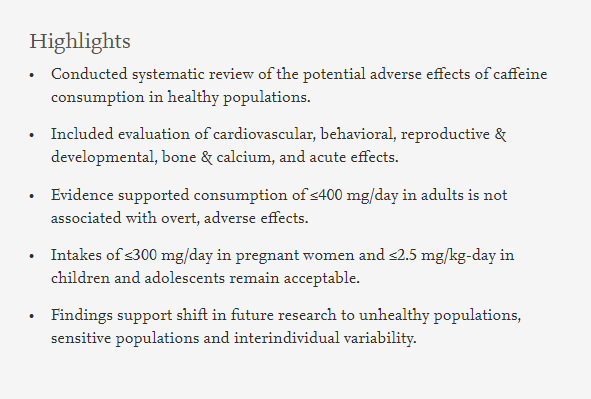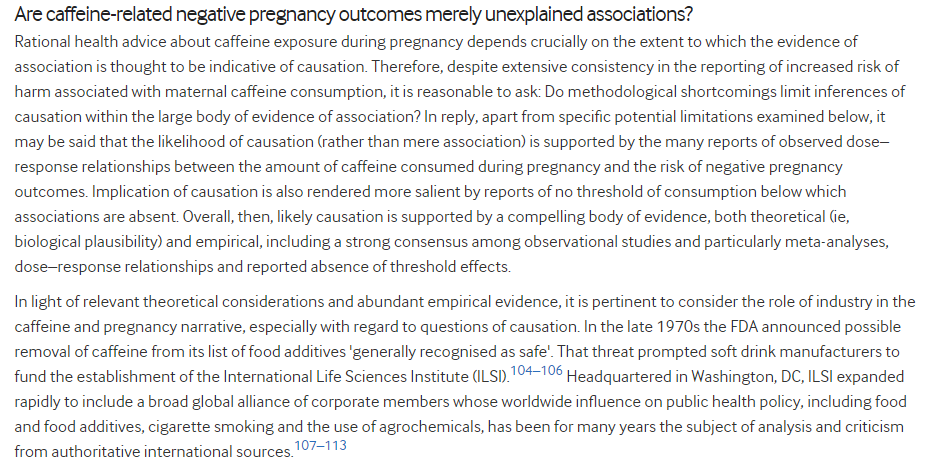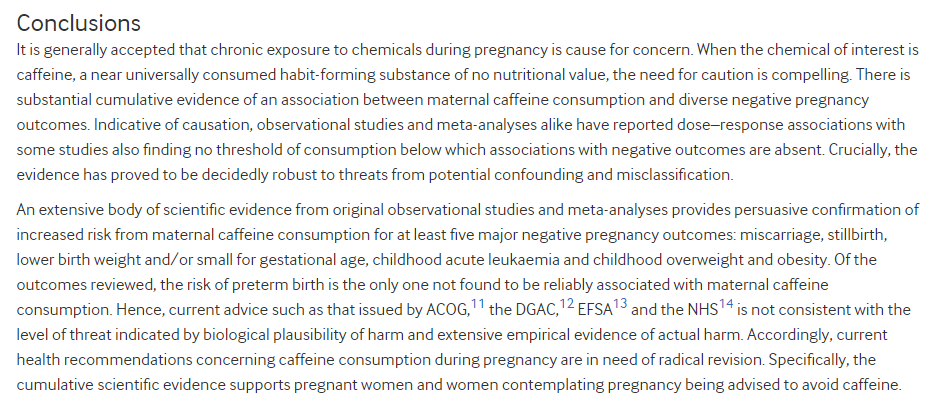A new study has come out that hit headlines everywhere arguing that there& #39;s no safe level of caffeine intake during pregnancy
I think it& #39;s worth a bit of a peer-review on twitter 1/n
I think it& #39;s worth a bit of a peer-review on twitter 1/n
2/n I should at the outset say that I have a bit of skin in the game - I& #39;ve previously looked at the evidence and argued that the harms at low levels of intake are not as worrying as they are often made out to be
https://www.theguardian.com/commentisfree/2019/oct/17/is-drinking-coffee-safe-during-your-pregnancy-get-ready-for-some-nuance">https://www.theguardian.com/commentis...
https://www.theguardian.com/commentisfree/2019/oct/17/is-drinking-coffee-safe-during-your-pregnancy-get-ready-for-some-nuance">https://www.theguardian.com/commentis...
3/n The study itself is here, in BMJ Evidence-Based Medicine: #DC1">https://ebm.bmj.com/content/early/2020/07/28/bmjebm-2020-111432 #DC1">https://ebm.bmj.com/content/e...
4/n The first problem comes right in the title - this is a & #39;narrative review& #39;
This is an issue because narrative reviews are generally not very good to rely on as proof
This is an issue because narrative reviews are generally not very good to rely on as proof
5/n This is because of how they are conducted. Narrative reviews are, by nature, non-systematic reviews of the literature. In other words, they are & #39;expert opinion& #39; level of data - they can inform, but it& #39;s hard to make conclusions based on them because of the methodology
6/n We can see quite clearly why when we read the methodology here. This is the entire methods section - 1 paragraph! - and doesn& #39;t tell us NEARLY enough about how the included studies were found
7/n Were studies excluded? If so, why? Could the included studies simply be cherry-picked for the authors conclusions? What& #39;s the risk of publication bias, or other biases?
We simply have no idea!
We simply have no idea!
8/n So right off the bat, we can& #39;t really say, from this study, much more than that this is one professor& #39;s expert opinion based on studies that they have identified
9/n Now, there& #39;s nothing wrong with that. Professors are smart, and often their opinions are very important
But this isn& #39;t ~evidence~ in a scientific sense. The review says nothing new per se except that Prof James, Psychology, has this opinion based on studies he& #39;s read
But this isn& #39;t ~evidence~ in a scientific sense. The review says nothing new per se except that Prof James, Psychology, has this opinion based on studies he& #39;s read
10/n On to the included studies
There are A LOT of them
Kudos to the author for reading all of this literature
There are A LOT of them
Kudos to the author for reading all of this literature
11/n Now, the problem is of course that to properly review a narrative review like this you would have to read every included piece of research, and with >40 studies to go through that& #39;s really quite a lot to do
12/n But, even if you look at just a few, some issues emerge. The single biggest study on caffeine and miscarriage, for example
In this review, it& #39;s cited as evidence that maternal caffeine consumption increases risk of miscarriage
In this review, it& #39;s cited as evidence that maternal caffeine consumption increases risk of miscarriage
13/n But actually, Gaskins et al found something a bit different. In their study, decaf coffee was associated with a higher risk and caffeinated tea was not
Therefore, caffeine was NOT the likely culprit!
Therefore, caffeine was NOT the likely culprit!
14/n This gets to the heart of the issue with a narrative review. It is, essentially, the author& #39;s opinion of each study and what they mean - no systematizing, no group of authors carefully reading through each point to be careful
15/n One person& #39;s evidence of the risk from caffeine is another person& #39;s evidence of safety
Case in point - this systematic review
Case in point - this systematic review
16/n In the narrative review, it& #39;s cited as evidence that any amount of caffeine is dangerous, but the authors actually concluded that their results were consistent with the WHO recommendation to limit caffeine consumption to <300mg per day during pregnancy
17/n Similarly, the Greenwood et al meta-analysis is cited as evidence that even small amounts of caffeine are probably harmful, but the authors don& #39;t really agree!
18/n All of this is fine, and just the limitations of the narrative review. The entire purpose of such a document is to provide a narrative decided on by the author, which is neither good nor bad - it& #39;s just how these things work
But that& #39;s not all of the issues
But that& #39;s not all of the issues
19/ If you get to the last part of the paper, you& #39;ll see this table
It contains a fundamental error that makes the numbers in the last column incorrect
It contains a fundamental error that makes the numbers in the last column incorrect
20/n This table is calculating the population attributable fraction of various pregnancy outcomes. The last column is the context - for the ~1 million miscarriages in the US each year, 280,000 are caused by caffeine!
Shocking. And untrue
Shocking. And untrue
21/n This table has several errors. The first is in column (i)
This is cited as the risk per 100mg. In fact, it is the RELATIVE RISK INCREASE per ADDITIONAL 100mg of coffee consumed
This is cited as the risk per 100mg. In fact, it is the RELATIVE RISK INCREASE per ADDITIONAL 100mg of coffee consumed
22/n This is then used to calculated the risk AT 200mg of miscarriage - double the risk at 100mg
Except, this is incorrect
Except, this is incorrect
23/n The BASELINE risk of miscarriage, for a woman who drinks NO coffee, is around 16%. The RELATIVE increase is 14% per 100mg of coffee. So the ABSOLUTE risk for a 200mg per day drinker is:
0.16*1.28 = .205 = 20.5%
Thus, all the numbers in column (ii) are wrong
0.16*1.28 = .205 = 20.5%
Thus, all the numbers in column (ii) are wrong
24/n The last column calculates the number of caffeine-related events by multiplying the risk in column (ii) with the total number in column (iv)
So, 28% risk and 1 mil miscarriages means 280k miscarriages related to caffeine
So, 28% risk and 1 mil miscarriages means 280k miscarriages related to caffeine
25/n Think about this for a second. Even if that number was correct - i.e. 20.5% rather than the wrong 28% - it doesn& #39;t make any sense because it assumes that 100% of women who have had miscarriages drank 200mg of caffeine a day
26/n This number - called the Population Attributable Fraction (PAF) - is actually calculable. The formula is pretty simple:
27/n In this case, with a prevalence of ~35% for caffeine intake of 200mg or higher, the number of miscarriages attributable to this is:
0.35*(1-(1/1.28)) = 0.763 = ~76,300 miscarriages
So, about a quarter of what& #39;s in this study
0.35*(1-(1/1.28)) = 0.763 = ~76,300 miscarriages
So, about a quarter of what& #39;s in this study
28/n This actually makes perfect sense when you think about it. Remember, the ABSOLUTE risk increase of miscarriage for women who drink caffeine is pretty small - 1-2% - so it doesn& #39;t really make sense to say that up to a third of miscarriages are caused by caffeine
29/n And yet, these figures were picked up in the media and thrown around as if certainly true, which is very worrying!
30/n More broadly speaking, do we know that caffeine causes bad pregnancy outcomes?
That is a VERY tricky question to answer
That is a VERY tricky question to answer
31/n This narrative review argues yes, absolutely, and while most people would agree a LOT of caffeine is a problem, much previous research has said that small amounts are probably not so bad
32/n This narrative review argues that all such studies are the product of industry funding, which is not entirely untrue, but also doesn& #39;t really tell the whole story given that it disagrees with non-industry studies as well
33/n Ultimately, reviews like this come down to opinions
Do we think that Prof James is correct and caffeine is definitely bad? Well, maybe. It depends on your perspective I think
Do we think that Prof James is correct and caffeine is definitely bad? Well, maybe. It depends on your perspective I think
34/n What we can& #39;t say is that this is new evidence, or even that we& #39;ve proven anything here. It& #39;s one well-researched opinion that you may or may not agree with  https://abs.twimg.com/emoji/v2/... draggable="false" alt="🤷♂️" title="Achselzuckender Mann" aria-label="Emoji: Achselzuckender Mann">
https://abs.twimg.com/emoji/v2/... draggable="false" alt="🤷♂️" title="Achselzuckender Mann" aria-label="Emoji: Achselzuckender Mann">
35/n Anyway, regardless of what you think of the review, it& #39;s probably worth correcting the inaccurate table @BMJ_EBM
36/n Also, for the record, I think the conclusions are pretty massively overstated, and also miss out a key part of recommendations which is the question of whether they& #39;ll be followed!
37/n I should also say that I thoroughly dislike opinion pieces and media attention like this
The evidence hasn& #39;t changed, and quite frankly I think pregnant people have enough to worry about without the fear that a cup of coffee will cause a miscarriage
The evidence hasn& #39;t changed, and quite frankly I think pregnant people have enough to worry about without the fear that a cup of coffee will cause a miscarriage

 Read on Twitter
Read on Twitter
